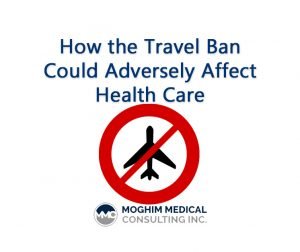 President Donald Trump has made immigration reform a priority for his administration, issuing two executive orders that restricted travel from several predominantly Muslim nations in the first few weeks of his new presidency. Although the first travel ban was struck down for being too broad, a reworked ban targets immigration from Syria, Iran, Libya, Sudan, Yemen, and Somalia (Iraq had been on the prior order). The more recent ban stalls refugee entry for 120 days and suspends entry from the stipulated countries for 90 days. The latest order is currently under judicial review.
President Donald Trump has made immigration reform a priority for his administration, issuing two executive orders that restricted travel from several predominantly Muslim nations in the first few weeks of his new presidency. Although the first travel ban was struck down for being too broad, a reworked ban targets immigration from Syria, Iran, Libya, Sudan, Yemen, and Somalia (Iraq had been on the prior order). The more recent ban stalls refugee entry for 120 days and suspends entry from the stipulated countries for 90 days. The latest order is currently under judicial review.
Trump has said that immigrants from these nations are more likely to have terrorist ties and pose a threat to national security. Although his national security concerns do have some merit, these new restrictions are having a deleterious effect on the health care sector. Almost 7,000 physicians currently working in the U.S. received their training in one of the six restricted countries, and these physicians receive almost 14 million patient visits each year.
The latest travel ban doesn’t oust these medical professionals from the country, but it does produce a chilling effect on immigration involving prospective doctors and medical students. This immigration ban is only the latest hurdle that foreign medical professionals must overcome in an immigration system that has grown considerably more restrictive following the events of September 11, 2001. The U.S. is already experiencing a serious shortage of physicians around the country, and especially in rural areas where many of these foreign-born physicians practice. Michigan, Ohio, Pennsylvania, Illinois and Florida have the highest population of physicians from blacklisted nations.
Long Term Implications
Many of the nation’s most important medical groups have criticized the travel ban. The American Medical Association has pointed to loss of providers in underserved areas as well as “creating unintended consequences for our nation’s health care system.” The New England Journal of Medicine published several opinion pieces warning that the travel ban could impede medical research and collaboration with international research organizations.
Many physicians and scientists may be unwilling to travel to conferences that take place outside of the U.S. due to fears that they may be denied reentry. Although this is less likely with the more recent immigration executive order which permits access to travelers with appropriate residency or visa status, there are lingering fears that Trump could revamp his order. This reluctance to travel abroad hinders the normal exchange of ideas which strengthen professional skills and expertise. This could setback many important initiatives including drug development and genomics.
This travel ban is likely to slow the ingress of qualified medical professionals from these targeted nations as well as others which support a large Muslim population. Almost 25 percent of the physicians practicing in the U.S. were trained abroad, and the current immigration restrictions may discourage other foreign-trained professionals from seeking position in the United States. With an expected shortage of 94,700 physicians by 2025, building impediments that turn away desperately needed physicians puts an enormous and unnecessary strain on an already overburdened health care system.
Article Written by: Robert Moghim, M.D.,- CEO Moghim Medical Consulting Inc.
